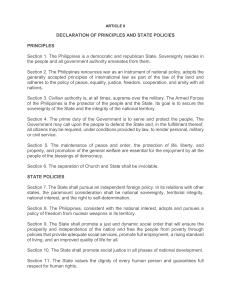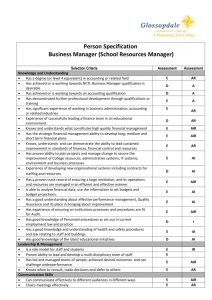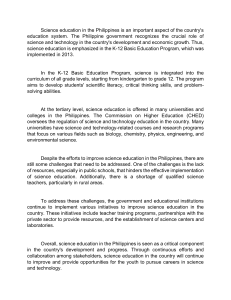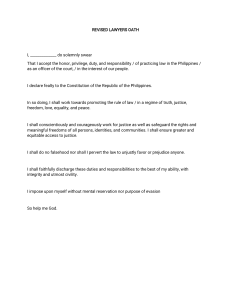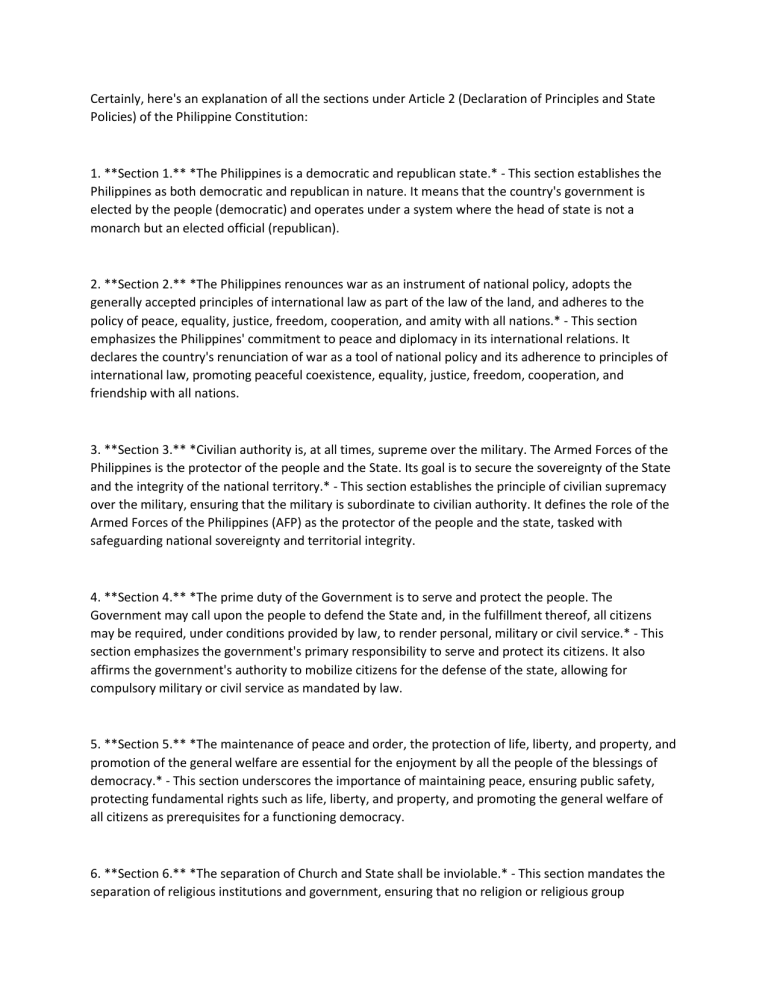
Certainly, here's an explanation of all the sections under Article 2 (Declaration of Principles and State Policies) of the Philippine Constitution: 1. **Section 1.** *The Philippines is a democratic and republican state.* - This section establishes the Philippines as both democratic and republican in nature. It means that the country's government is elected by the people (democratic) and operates under a system where the head of state is not a monarch but an elected official (republican). 2. **Section 2.** *The Philippines renounces war as an instrument of national policy, adopts the generally accepted principles of international law as part of the law of the land, and adheres to the policy of peace, equality, justice, freedom, cooperation, and amity with all nations.* - This section emphasizes the Philippines' commitment to peace and diplomacy in its international relations. It declares the country's renunciation of war as a tool of national policy and its adherence to principles of international law, promoting peaceful coexistence, equality, justice, freedom, cooperation, and friendship with all nations. 3. **Section 3.** *Civilian authority is, at all times, supreme over the military. The Armed Forces of the Philippines is the protector of the people and the State. Its goal is to secure the sovereignty of the State and the integrity of the national territory.* - This section establishes the principle of civilian supremacy over the military, ensuring that the military is subordinate to civilian authority. It defines the role of the Armed Forces of the Philippines (AFP) as the protector of the people and the state, tasked with safeguarding national sovereignty and territorial integrity. 4. **Section 4.** *The prime duty of the Government is to serve and protect the people. The Government may call upon the people to defend the State and, in the fulfillment thereof, all citizens may be required, under conditions provided by law, to render personal, military or civil service.* - This section emphasizes the government's primary responsibility to serve and protect its citizens. It also affirms the government's authority to mobilize citizens for the defense of the state, allowing for compulsory military or civil service as mandated by law. 5. **Section 5.** *The maintenance of peace and order, the protection of life, liberty, and property, and promotion of the general welfare are essential for the enjoyment by all the people of the blessings of democracy.* - This section underscores the importance of maintaining peace, ensuring public safety, protecting fundamental rights such as life, liberty, and property, and promoting the general welfare of all citizens as prerequisites for a functioning democracy. 6. **Section 6.** *The separation of Church and State shall be inviolable.* - This section mandates the separation of religious institutions and government, ensuring that no religion or religious group dominates the affairs of the state and vice versa. It upholds the principle of religious freedom and prohibits the establishment of a state religion. 7. **Section 7.** *The State shall pursue an independent foreign policy. In its relations with other states, the paramount consideration shall be national sovereignty, territorial integrity, national interest, and the right to self-determination.* - This section asserts the Philippines' commitment to an independent foreign policy, prioritizing national sovereignty, territorial integrity, national interest, and the right to self-determination in its interactions with other countries. It emphasizes the importance of safeguarding the country's autonomy and interests in the international arena. Certainly, here's an explanation of Sections 8 to 28 under Article 2 (Declaration of Principles and State Policies) of the Philippine Constitution: 8. **Section 8.** *The Philippines, consistent with the national interest, adopts and pursues a policy of freedom from nuclear weapons in its territory.* - This section declares the Philippines' policy of freedom from nuclear weapons within its territory, aligning with the broader global efforts towards nuclear disarmament and non-proliferation. 9. **Section 9.** *The State shall promote a just and dynamic social order that will ensure the prosperity and independence of the nation and free the people from poverty through policies that provide adequate social services, promote full employment, a rising standard of living, and an improved quality of life for all.* - This section outlines the State's obligation to establish a fair and progressive social system aimed at fostering national prosperity, independence, and the eradication of poverty. It emphasizes the implementation of policies that ensure access to essential social services, promote employment opportunities, and enhance the overall well-being of the populace. 10. **Section 10.** *The State shall promote social justice in all phases of national development.* - This section mandates the promotion of social justice across all aspects of the country's development endeavors, ensuring equitable distribution of resources, opportunities, and benefits among all segments of society. 11. **Section 11.** *The State values the dignity of every human person and guarantees full respect for human rights.* - This section affirms the State's commitment to upholding the dignity and human rights of every individual within its jurisdiction, ensuring their protection and full recognition under the law. 12. **Section 12.** *The State recognizes the sanctity of family life and shall protect and strengthen the family as a basic autonomous social institution.* - This section acknowledges the importance of family as the fundamental unit of society and pledges governmental support for its preservation and enhancement as an independent social institution. 13. **Section 13.** *The State recognizes the vital role of the youth in nation-building and shall promote and protect their physical, moral, spiritual, intellectual, and social well-being.* - This section underscores the significance of the youth in the nation's progress and commits the State to safeguarding their holistic development across various dimensions of life. 14. **Section 14.** *The State recognizes the role of women in nation-building and shall ensure the fundamental equality before the law of women and men.* - This section acknowledges the indispensable contribution of women to national development and mandates the guarantee of equal rights and opportunities for both genders under the law. 15. **Section 15.** *The State shall protect and promote the right to health of the people and instill health consciousness among them.* - This section obliges the State to safeguard and advance the people's right to health, as well as to foster awareness and adherence to healthy lifestyles and practices. 16. **Section 16.** *The State shall protect and advance the right of the people to a balanced and healthful ecology in accord with the rhythm and harmony of nature.* - This section emphasizes the State's responsibility to preserve and enhance the environment for the benefit of present and future generations, ensuring ecological sustainability and harmony with the natural world. 17. **Section 17.** *The State shall give priority to education, science, and technology, arts, culture, and sports to foster patriotism and nationalism, accelerate social progress, and promote total human liberation and development.* - This section underscores the importance of prioritizing education, scientific advancement, cultural development, and sports to cultivate patriotism, drive social advancement, and facilitate holistic human growth and liberation. 18. **Section 18.** *The State affirms labor as a primary social economic force. It shall protect the rights of workers and promote their welfare.* - This section recognizes labor as a fundamental driver of the economy and commits the State to safeguarding the rights and well-being of workers, ensuring fair treatment, and promoting their welfare. 19. **Section 19.** *The State shall develop a self-reliant and independent national economy effectively controlled by Filipinos.* - This section advocates for the establishment of a self-sufficient and autonomous national economy that is predominantly owned and managed by Filipino citizens, reducing dependence on external factors and enhancing economic sovereignty. 20. **Section 20.** *The State recognizes the indispensable role of the private sector, encourages private enterprise, and provides incentives to needed investments.* - This section acknowledges the vital contribution of the private sector to economic development and encourages its active participation through incentives and support for investment activities deemed beneficial to the nation. 21. **Section 21.** *The State shall promote comprehensive rural development and agrarian reform.* This section commits the State to fostering holistic development in rural areas and implementing agrarian reform programs aimed at addressing land inequality, improving agricultural productivity, and enhancing the welfare of rural communities. 22. **Section 22.** *The State recognizes and promotes the rights of indigenous cultural communities within the framework of national unity and development.* - This section acknowledges the rights of indigenous cultural communities and pledges governmental support for their preservation, protection, and integration within the broader framework of national unity and progress. 23. **Section 23.** *The State shall encourage non-governmental, community-based, or sectoral organizations that promote the welfare of the nation.* - This section advocates for the promotion and support of non-governmental, community-based, or sectoral organizations dedicated to advancing the welfare and interests of the nation and its populace. 24. **Section 24.** *The State recognizes the vital role of communication and information in nationbuilding.* - This section acknowledges the significance of communication and information dissemination in fostering national cohesion, public awareness, and participation in the development process. 25. **Section 25.** *The State shall ensure the autonomy of local governments.* - This section guarantees the autonomy of local government units (LGUs), empowering them with self-governing authority and administrative independence within the framework of the national government. 26. **Section 26.** *The State shall guarantee equal access to opportunities for public service and prohibit political dynasties as may be defined by law.* - This section mandates the State to ensure equal access to opportunities for public service, while also prohibiting the establishment and perpetuation of political dynasties, subject to specific legal definitions and regulations. 27. **Section 27.** *The State shall maintain honesty and integrity in the public service and take positive and effective measures against graft and corruption.* - This section underscores the State's commitment to promoting honesty, integrity, and accountability in public service, as well as implementing measures to combat graft and corruption effectively. 28. **Section 28.** *Subject to reasonable conditions prescribed by law, the State adopts and implements a policy of full public disclosure of all its transactions involving public interest.* - This section mandates the State to practice transparency and accountability by ensuring full public disclosure of all government transactions pertaining to matters of public interest, subject to reasonable legal provisions and conditions.

